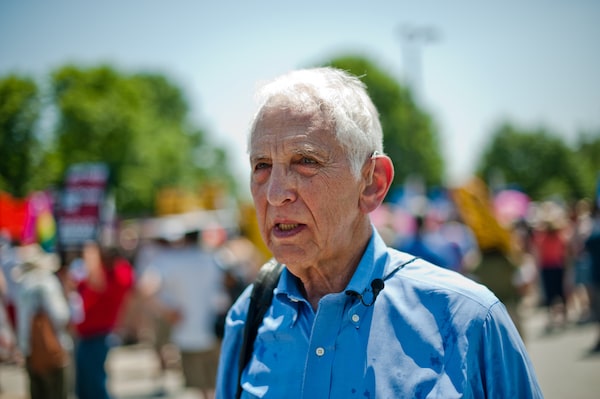
Pentagon Papers whistleblower Daniel Ellsberg attends a demonstration in support of Wikileaks whistleblower U.S. Army Private Bradley Manning, at Fort Meade in Maryland, on on June 1, 2013.NICHOLAS KAMM/Getty Images
Daniel Ellsberg, the former military analyst who leaked the Pentagon Papers in 1971, has come to the defence of Julian Assange, telling a British court that the WikiLeaks founder will not get a fair trial in the United States.
Mr. Ellsberg testified Wednesday that he has great affinity for Mr. Assange and praised him for publishing thousands of pages of classified U.S. military documents in 2010, which included reports of atrocities by American forces in Iraq and Afghanistan.
“I was very glad that the American public was confronted with this reality of war,” Mr. Ellsberg told Mr. Assange’s extradition hearing. “The reports of torture and of assassination and death squads were clearly describing war crimes.”
Mr. Ellsberg, 89, is considered a hero in many circles for handing The New York Times and other newspapers more than 7,000 pages of top-secret military files relating to the U.S. government’s handling of the Vietnam War. The revelations helped end the war and establish legal precedents concerning freedom of the press.
The former Marine has been one of the star witnesses for Mr. Assange, who is fighting extradition to the U.S., where he faces an 18-count indictment for allegedly violating espionage laws. He has also been accused of helping former Army intelligence analyst Chelsea Manning hack into U.S. Department of Defence computers to obtain the documents. Ms. Manning received a 35-year sentence in 2013 for violating the Espionage Act, but the jail term was commuted by president Barack Obama in 2017.
Mr. Ellsberg said he faced similar espionage charges in the 1970s over the release of the Pentagon Papers. The case against him was going badly for him, he added, and it only fell apart after reports surfaced that president Richard Nixon had ordered aides to break into the office of Mr. Ellsberg’s psychiatrist.
“I did not get a fair trial,” Mr. Ellsberg said. “No one since me has had a fair trial under those charges. Julian Assange could not get a remotely fair trial for what he has done under those charges in the United States.”
He said the information disclosed by Mr. Assange rivalled the Pentagon Papers: “These revelations, like the Pentagon Papers, had the capability of informing the public that they had been seriously misled about the nature of the war, the progress of the war and the likelihood that it would be ended successfully.”
He added that he was impressed that Ms. Manning “had been willing to face life in prison in order to get this information to the public.
"That’s the first time that I’ve heard anyone say that since I felt that.”
James Lewis, a British lawyer representing U.S. prosecutors, took pains to differentiate what Mr. Ellsberg did from what Mr. Assange did. He noted that Mr. Ellsberg held back some of the Pentagon Papers for years over concerns they could derail negotiations to end the war. Mr. Assange, Mr. Lewis said, showed no such discretion and published material that put informants and other U.S. sources at risk.
Mr. Lewis said Mr. Assange has not been charged with publishing most of the classified information. The charges against him only relate to helping Ms. Manning and publishing “a relatively small number of documents where the unredacted names of sources or informants" put them "in grave danger.” He cited numerous examples of people named in the WikiLeaks files being subsequently harassed by terrorists and governments, including reports in The Globe and Mail that China used the information to go after critics in Canada.
Mr. Ellsberg shot back that he had seen no evidence that any of those threats had been carried out or that anyone named by WikiLeaks had been killed, tortured or incarcerated. He added that Mr. Assange withheld thousands of documents to protect informants. And he rejected suggestions that his actions were somehow more honourable than Mr. Assange’s.
“I totally disagree with the ‘good Ellsberg, bad Assange’ theory,” he said. “I see no difference between the charges made against Julian Assange and the charges made against me.”
The hearing has been held under strict pandemic protocols, with most of the witnesses, including Mr. Ellsberg, testifying via video. That has led to repeated technical issues, and during Wednesday’s hearing Mr. Ellsberg’s son had to help him navigate his computer.
The hearing was also interrupted briefly by Mr. Assange, who has been denied bail and is brought to court every day from jail to watch the proceedings. At one point he started heckling Judge Vanessa Baraitser, who threatened to kick him out.
“Mr. Assange, please don’t put me in a position where I am forced to remove you,” she told him. “You cannot shout out from the dock during the course of evidence. It’s unacceptable and it’s not allowed by the rules of this court, so please remain silent.”
The hearing is expected to last several more weeks.
Our Morning Update and Evening Update newsletters are written by Globe editors, giving you a concise summary of the day’s most important headlines. Sign up today.
 Paul Waldie
Paul Waldie